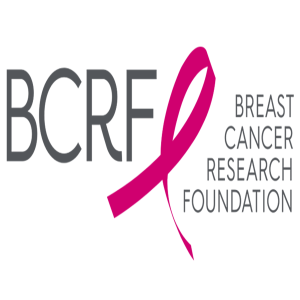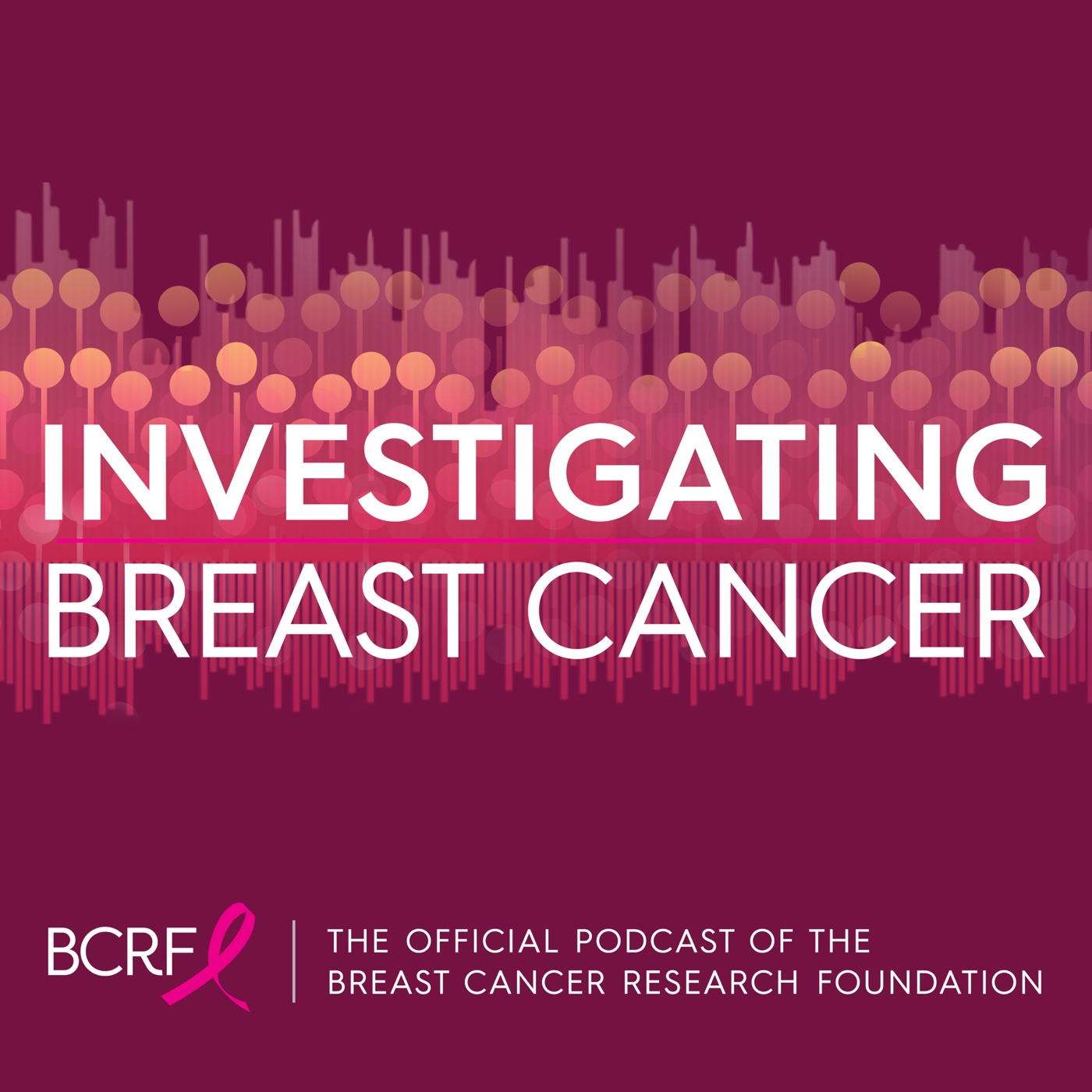Episodes

Wednesday Aug 05, 2020
Closing the Gap in Breast Cancer Care with Dr. Mariana Chavez MacGregor
Wednesday Aug 05, 2020
Wednesday Aug 05, 2020
Research shows that when chemotherapy is delayed, a patient’s chance of survival falls significantly. Dr. Mariana Chavez MacGregor, a BCRF investigator since 2018, joined our podcast to talk about her work with underserved and underinsured patients—those who are most likely to experience delays—to develop personalized ways to improve healthcare access and, ultimately, outcomes.
Dr. MacGregor is an associate professor at the University of Texas MD Anderson Cancer Center, holding a primary appointment in the Health Services Research Department and a joint appointment in the Breast Medical Oncology Department.

Tuesday Jun 30, 2020
The Promise and Potential of Breast Cancer Vaccines with Dr. Karen Anderson
Tuesday Jun 30, 2020
Tuesday Jun 30, 2020
One key goal in developing precision vaccines and immune therapies is to reduce the risk of breast cancer recurrence. Yet currently, there is only one FDA-approved immunotherapy drug for breast cancer, and it benefits just a small subset of women.
In this episode of Investigating Breast Cancer, we talk with Dr. Karen Anderson about vaccines, harnessing the power of a person’s immune system, and reducing the risk of breast cancer recurrence. And of course, we’d all like to know: What’s the progress? And how has COVID-19 impacted this research?

Thursday May 28, 2020
The Underlying Biology of Drug Resistance with Dr. Sarat Chandarlapaty
Thursday May 28, 2020
Thursday May 28, 2020
Advances in cancer therapy have dramatically contributed to the decline in breast cancer deaths over the last three decades. But even with these advances, drug resistance—when tumors stop responding to anti-cancer drugs—remains a serious clinical challenge. Dr. Sarat Chandarlapaty talks about the strategies to prevent cancer cells from evading the drugs designed to kill them.
Dr. Chandarlapaty is a laboratory head at the Human Oncology and Pathogenesis Program at the Memorial Sloan Kettering Cancer Center. He's also a BCRF Scientific Advisory Board member and has been a BCRF researcher since 2015.

Tuesday Apr 28, 2020
A Cross-disciplinary Approach to Breast Cancer Research with Dr. Antonio Wolff
Tuesday Apr 28, 2020
Tuesday Apr 28, 2020
In the fight to understand and solve breast cancer, “it takes a village.” In this case, the village is more like a globally connected series of research labs, scientists, patients, funders and more. In other words, something that looks a lot like the Translational Breast Cancer Research Consortium (TBCRC). The TBCRC is a collaborative group founded in 2005 to conduct innovative and high-impact clinical trials for breast cancer led by Dr. Antonio Wolff.
Dr. Wolff, a BCRF investigator since 2007, is the Chief Operating Officer for the Translational Breast Cancer Research Consortium (TBCRC).

Tuesday Mar 24, 2020
Breast Cancer Care and COVID-19: From the Frontlines with Dr. Judy Garber
Tuesday Mar 24, 2020
Tuesday Mar 24, 2020
Breast cancer—and any cancer—can be incredibly stressful under the best of circumstances for patients, survivors, and their families. In this time of the novel coronavirus (COVID-19), concerns can feel like they’re rising exponentially. So, what do we all need to know? With tons of new information bombarding us at once, what should cancer patients and families consider? Are there practical tactics or is there tangible guidance to stay safe?
In this special episode of Investigating Breast Cancer, we talk to Dr. Judy Garber for the answers. Dr. Garber is BCRF’s scientific director and chief of the Division of Cancer Genetics and Prevention at the Dana-Farber Cancer Institute in Boston.

Friday Feb 28, 2020
Developing Personalized Risk Prediction with Dr. Mark Robson
Friday Feb 28, 2020
Friday Feb 28, 2020
Dr. Mark Robson talks about how he’s working to help identify the right tests for the right person at the right age
How can researchers provide more precise risk estimates so that individuals with inherited risks can make informed decisions about their health, so that the right women are getting the right tests at the right age? Dr. Robson is conducting studies that employ advanced technologies that incorporate information from genetic tests to enhance the precision of genetic risk assessment in women with mutations in the BRCA gene.

Friday Jan 17, 2020
Unraveling Metastatic Breast Cancer, with Dr. Martine Piccart
Friday Jan 17, 2020
Friday Jan 17, 2020
Dr. Martine Piccart talks to us about the power of collaboration in metastatic breast cancer research
Metastasis, the spread of cancer cells from the breast to other sites in the body, is responsible for nearly all breast cancer deaths. Approximately 150,000 men and women are diagnosed with metastatic breast cancer each year. Today, BCRF is the largest private funder of this critical area of research.
Dr. Martine Piccart is passionate about metastasis research and the vital role that international collaboration plays in her work. A BCRF investigator since 2004, Dr. Piccart’s research aims to better understand the origins of metastatic breast cancer and how it evolves. Through the Breast International Group (BIG), she oversees the AURORA-EU study, the Belgium-based arm of the Evelyn H. Lauder Founder’s Fund for Metastatic Breast Cancer Research. Named for BCRF’s founder, the Founder’s Fund is a multi-year, international collaboration. In 2019, AURORA-EU presented findings on the molecular differences between metastatic cells and other tumor cells, revealing a new avenue of research including the potential for targeted treatments.
Dr. Piccart is Professor of Oncology at the Université Libre de Bruxelles, Belgium, and Director of Medicine at the Institut Jules Bordet. She is also the co-founder and chair of BIG, which unites 55 academic research groups from around the world, running over 30 trials, and developing numerous research programs.

Friday Dec 20, 2019
Young women and breast cancer, with Dr. Ann Partridge
Friday Dec 20, 2019
Friday Dec 20, 2019
This is where Dr. Ann Partridge steps in. Her BCRF-supported research seeks to understand the complex issues young women with breast cancer face. Dr. Partridge studies the biology behind their breast cancers as well as focusing on how young women make their way through their experiences – whether it’s physical or emotional.
A BCRF researcher since 2016, Dr. Partridge is co-founder and director of the Young and Strong Program for Young Women with Breast Cancer, and serves as the Director of the Adult Survivorship Program at Dana-Farber Cancer Institute and Brigham and Women’s Hospital. Dr. Partridge is Professor of Medicine, Harvard Medical School.

Monday Dec 02, 2019
BCRF Symposium & Awards Luncheon: Live from New York City
Monday Dec 02, 2019
Monday Dec 02, 2019
Every October, BCRF-funded researchers are honored at the annual Symposium & Awards Luncheon in New York City. This is when BCRF makes its formal announcement of research grants for the upcoming year and recognizes its investigators for their devotion to ending breast cancer with their trailblazing scientific inquiry. The event provides a unique opportunity for BCRF researchers to convene, share ideas and collaborate with fellow colleagues from around the world. This year’s program began with a symposium featuring an expert panel of BCRF investigators. They discussed current breaking topics in breast cancer research, ranging from prevention and diagnosis to treatment and survivorship. We’re proud to share that discussion here in this special bonus podcast.

Friday Oct 11, 2019
Friday Oct 11, 2019
Metastasis, when cancer cells leave the breast and spread to other sites in the body, is the major cause of mortality from breast cancer. The brain is one of the most common organs breast cancer invades, occurring in more than one third of patients with advanced breast cancer, up to 300,000 patients a year. The prognosis of cancer patients who develop brain metastasis is poor, with only 20 percent of patients surviving at one year.
For Dr. Priscilla Brastianos, a BCRF investigator since 2017, this cause hits close to home. Both her mother and grandmother died of metastatic breast cancer. That’s why she has dedicated her career to better understanding brain metastasis. As the Director of the Central Nervous System Metastasis Program & Assistant Professor of Medicine at Harvard Medical School and Massachusetts General Hospital, her research focuses on understanding the mechanisms driving metastatic disease to the brain. She is currently conducting studies to characterize the genetic and molecular profiles of brain metastasis compared to primary breast cancer with the goal of identifying potential targets for therapy and strategies to improve response to existing therapies.

